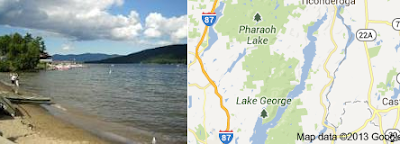Save Lake George: IBM, Rensselaer Polytechnic Institute and the FUND for Lake George find an agreement.
For those who love tourism, nature, wonderful landscape, Lake George in New
York represents the ultimate destination.
June 27, 2013, marks a new turning for this patrimony. In fact,
“The Jefferson Project at Lake George,” a three-year, multi-million dollar collaboration with the goal of understanding and managing complex factors, including road salt, storm water runoff and invasive species, threatening one of the world’s most pristine natural ecosystems and an economic cornerstone of the New York tourism industry is launched.
“The Jefferson Project at Lake George,” a three-year, multi-million dollar collaboration with the goal of understanding and managing complex factors, including road salt, storm water runoff and invasive species, threatening one of the world’s most pristine natural ecosystems and an economic cornerstone of the New York tourism industry is launched.
The collaboration partners expect that this world-class scientific and
technology facility at Lake George will create a new model for predictive preservation
and remediation of critical natural systems on Lake George, in New York, and
ultimately around the world.
‘’Scientists from Rensselaer have been studying the Lake for 30 years and
have noted the emergence of environmental stressors that include rising levels
of chlorophyll that threatens water clarity and a threefold increase in salt
levels primarily due to road salt applied to roads in the watershed. Lake
George tourism alone accounts for an estimated $450 million of economic
activity in Warren County and approximately $1 billion in the surrounding
region. The long-term health of the Lake is critical to the region and New York
State’s tourism industry.’’
‘’The collaboration partners plan to use a combination of advanced data
analytics, computing and data visualization techniques, new scientific and
experimental methods, 3-D computer modeling and simulation, and historical data
expecting to gain an unprecedented scientific understanding of Lake George.
Also central to the project will be weather modeling and sensor technology
similar to those used by IBM around the world at locations including Rio de
Janeiro, Ireland’s Galway Bay, and New York’s Hudson River. The combination of
these unique predictive capabilities will enable scientists and the community to
prioritize and act before permanent degradation can take place.’’
‘’For example, the new monitoring system is expected to give scientists a
view for the first time of circulation models in Lake George. These 3-D models
could then be used to understand how currents distribute nutrients and
contaminants across the 32-mile lake and their correlation to specific
stressors. These models could be overlaid with historical and real-time weather
data to see the impact of weather and tributary flooding on circulation patterns
in Lake George.’’
In this process and dynamic, ‘’IBM plans to provide hardware, software, and
supporting services to help create a new, Smarter Water laboratory and
visualization studio at Rensselaer’s Margaret A. and David M. Darrin `40 Fresh
Water Institute on Lake George. A team of IBM Smarter Water experts, in
partnership Rensselaer and the FUND for Lake George, plan to pair their
expertise with this new technology to help local leaders see a real-time
picture of the current and future computer modeled conditions, water chemistry,
and health of the natural systems. Local groups could use this data to make
informed decisions on the protection of Lake George’s pristine waters and
unique ecosystem.’’
‘
About Rensselaer
Rensselaer Polytechnic Institute, founded in 1824, is the nation’s oldest
technological research university. The university offers bachelor’s, master’s,
and doctoral degrees in engineering, the sciences, information technology,
architecture, management, and the humanities and social sciences. Institute
programs serve undergraduates, graduate students, and working professionals
around the world. Rensselaer faculty are known for pre-eminence in research
conducted in a wide range of fields, with particular emphasis in biotechnology,
nanotechnology, computation and information technology, the media arts and
technology, and energy and the environment. The Institute is well known for its
success in the transfer of technology from the laboratory to the marketplace so
that new discoveries and inventions benefit human life, protect the
environment, and strengthen economic development.
About IBM Smarter Planet
With advances in technology, sophisticated sensor networks, smart meters,
deep computing and Big Data analytics, IBM is helping clients and cities make
smarter decisions about water management. By monitoring, measuring and
analyzing water systems, from rivers and reservoirs to pumps and pipes, we can
better understand the issues around water. IBM is applying its expertise in
smart systems and data analysis to help companies, governments and citizens
understand and more effectively deal with these issues. For more information,
please visit www.ibm.com/smarterplanet/water.
About The Fund for Lake George
The FUND for Lake George is a privately funded not-for-profit organization
dedicated to the protection of Lake George. Formed in 1980, the FUND applies a
science-based approach to protection focused on Lake George water quality and
the overall health of the Lake George watershed. The FUND pursues this mission
through support of long-term scientific research, direct advocacy, and
strategic partnerships with diverse public and private interests. The FUND
recently adopted its “Legacy Strategy” that focuses on environmental and
economic imperatives as now required to protect Lake George for the next
generation. The FUND sponsors the Lake George Waterkeeper among other programs
on Lake George. The FUND for Lake George is managed by a Board of Trustees and
maintains an office in Lake George.


